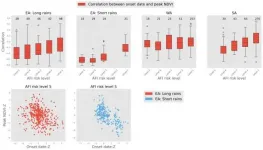(Press-News.org) In the first systematic large-scale evaluation of the UK National Early Warning Risk Score (NEWS) 2 as a scoring system for predicting severe COVID-19 outcomes in patients, researchers at King's College London have found poor-to-moderate accuracy for identifying patients at risk of being transferred to intensive care units (ICUs) or dying after 14 days of hospitalisation. Accuracy of predictions in short term (three days) showed moderate success.
For people who are hospitalised with severe COVID-19, it is vital to quickly identify which patients may deteriorate and require transfer to an intensive care unit (ICU) for organ support or may die. NEWS2 is an early warning score that combines physiological parameters such as respiration rate, oxygen saturation, blood pressure and temperature. NEWS2 is currently used almost universally in UK NHS Trusts to identify which patients are at risk of deteriorating early.
The paper was published today (Thursday 21 January) in BMC Medicine.
Accuracy of NEWS2
Researchers analysed data from 1,276 COVID-19 patients admitted to King's College Hospital NHS Foundation Trust during the first wave in March-April 2020. The team then validated their models using data for over 6,000 patients across eight other hospitals globally (five in the UK, one in Norway, and two in China). At all UK sites, around one third of patients with COVID-19 were transferred to ICU or died within 14 days of hospital admission.
The researchers evaluated how well patients' NEWS2 scores measured at hospital admission anticipated who would have severe COVID-19 outcomes, which means either being transferred to ICU or dying. In all UK sites, combining NEWS2 and age to predict outcomes showed moderate success in the short term (three days), but for poor-to-moderate success for medium-term (14 days) outcomes.
Dr Ewan Carr, Statistician Research Fellow at the Institute of Psychiatry, Psychology & Neuroscience, King's College London, and co-lead author said: "We have conducted the largest study to date evaluating the accuracy of NEWS2 for predicting medium-term COVID outcomes. NEWS2 is widely used in UK NHS trusts but little is known about how well it can predict severe COVID outcomes and so evaluating its accuracy is important as we look to improve patient care now and in future.
By collecting data from nine hospitals globally, our results have robust external validation. We found consistency across sites both in the performance of NEWS2 alone, as well as for the supplemented model. In short, NEWS2 tended to have poor-moderate performance but was improved by adding common blood and physiological measures."
The research team used CogStack, an existing platform developed by NIHR Maudsley BRC and in use at King's College Hospital NHS Foundation Trust, which allows for rapid extraction and processing of data from patient's electronic health records.
Professor Richard Dobson, Head of the Department of Biostatistics & Health Informatics, NIHR Maudsley BRC, said: "The CogStack platform allows us to extract information from deep within hospital records at King's College Hospital NHS Foundation Trust in real time in order really explore complex questions such as this. This includes being able to extract information relating to co-morbidities, for example, that may only be mentioned in passing in the physician narrative"
Improving predictive ability
Researchers found that accuracy in predicting severe outcomes was improved by considering routinely-collected blood and physiological parameters from patients including age, oxygen saturation and neutrophil count, which is an important infection-fighting immune system cell. In models that supplemented NEWS2 with these parameters the ability to predict severe outcomes was improved.
Dr James Teo, Consultant Neurologist at King's College Hospital and Clinical Director of Data Science and lead of CogStack platform, said: "Our results for the first time validates NEWS2, and shows how it could be improved by adding common blood and physiological parameters. Thankfully, this NHS scoring system is easy to adapt and implement in real-world clinical practice, compared to other complex risk-scoring models.
I, alongside all the authors and collaborators, would like to thank the guidance and contributions of the patients and members of the King's Electronic Records Research Interface that made this all possible."
INFORMATION:
The study was a collaboration between the National Institute for Health Research (NIHR) Maudsley Biomedical Research Centre (BRC) and the Medical Research Council (MRC).
Notes to editors
Data analyzed comes from patients admitted to: King's College Hospital National Health Service (NHS) Foundation Trust, Guy's and St Thomas' NHS Foundation Trust Hospitals, University Hospitals Southampton, University Hospitals Bristol and Weston NHS Foundation Trust, University College London Hospitals, University Hospitals Birmingham, one hospital in Norway (Oslo University Hospital), and two hospitals in Wuhan, China (Wuhan Sixth Hospital and Taikang Tongji Hospital).
Contact
To receive a copy of the embargoed paper or to arrange interviews please contact the Communications team at NIHR Maudsley BRC:
Alex Booth, Communications and Engagement Manager, NIHR Maudsley Biomedical Research Centre, Tel 020 7848 0495 alex.booth@kcl.ac.uk
Serena Rianjongdee, Communications and Engagement Officer, NIHR Maudsley Biomedical Research Centre, Tel 020 7848 2137 serena.rianjongdee@kcl.ac.uk
The National Institute for Health Research (NIHR)
NIHR is the nation's largest funder of health and care research. The NIHR:
Funds, supports and delivers high quality research that benefits the NHS, public health and social care
Engages and involves patients, carers and the public in order to improve the reach, quality and impact of research
Attracts, trains and supports the best researchers to tackle the complex health and care challenges of the future
Invests in world-class infrastructure and a skilled delivery workforce to translate discoveries into improved treatments and services
Partners with other public funders, charities and industry to maximise the value of research to patients and the economy
The NIHR was established in 2006 to improve the health and wealth of the nation through research, and is funded by the Department of Health and Social Care. In addition to its national role, the NIHR supports applied health research for the direct and primary benefit of people in low- and middle-income countries, using UK aid from the UK government. http://www.nihr.ac.uk/
About King's College London and the Institute of Psychiatry, Psychology & Neuroscience
King's College London is one of the top 10 UK universities in the world (QS World University Rankings, 2020) and among the oldest in England. King's has more than 31,000 students (including more than 12,800 postgraduates) from some 150 countries worldwide, and some 8,500 staff.
The Institute of Psychiatry, Psychology & Neuroscience (IoPPN) at King's College London is the premier centre for mental health and related neurosciences research in Europe. It produces more highly cited outputs (top 1% citations) on mental health than any other centre (SciVal 2019) and on this metric we have risen from 16th (2014) to 4th (2019) in the world for highly cited neuroscience outputs. World-leading research from the IoPPN has made, and continues to make, an impact on how we understand, prevent and treat mental illness and other conditions that affect the brain.
http://www.kcl.ac.uk/ioppn @KingsIoPPN
Researchers from the University of Cambridge have discovered a fossil of the earliest starfish-like animal, which helps us understand the origins of the nimble-armed creature.
The prototype starfish, which has features in common with both sea lilies and modern-day starfish, is a missing link for scientists trying to piece together its early evolutionary history.
The exceptionally preserved fossil, named Cantabrigiaster fezouataensis, was discovered in Morroco's Anti-Atlas mountain range. Its intricate design - with feathery arms akin to a lacework - has been frozen in time for roughly 480 million years.
The new species is unusual because it doesn't have many of the key features of its contemporary relatives, lacking roughly 60% of ...
Antidepressants are commonly used worldwide to treat pain, however new research from the University of Sydney shows they offer little to no help for people suffering chronic back pain and osteoarthritis and may even cause harm.
Back pain and knee osteoarthritis affect millions of people globally and are leading causes of disability. When first-line pain medications such as paracetamol and ibuprofen fail to improve symptoms, many people are prescribed antidepressants for their pain. Most clinical practice guidelines recommend antidepressants for long term (chronic) back pain and hip and knee osteoarthritis, yet evidence supporting their use is uncertain.
Published today in the BMJ the ...
Antidepressant drugs are largely ineffective for back and osteoarthritis pain, despite being widely used for these conditions, suggests a review of the evidence published by The BMJ today.
The findings, based on moderate certainty evidence, show that for people with back pain the effects were too small to be worthwhile, but for osteoarthritis a small beneficial effect cannot be ruled out.
Most clinical practice guidelines recommend antidepressants for long term (chronic) back pain and hip and knee osteoarthritis, yet evidence supporting their use is uncertain.
To address this knowledge gap, researchers led by Giovanni Ferreira at the ...
Adding the arthritis drug tocilizumab to standard care for patients in hospital with severe or critical covid-19 is no better than standard care alone in improving clinical outcomes at 15 days, finds a new trial published by The BMJ today.
There was an increased number of deaths at 15 days in patients receiving tocilizumab, resulting in the trial being stopped early.
Today's results contradict earlier observational studies suggesting a benefit of tocilizumab. However, observational effects are limited by a high risk that they may be due to other unknown (confounding) factors - and some studies have not yet been peer ...
MINNEAPOLIS - A new study has found a brain pressure disorder called idiopathic intracranial hypertension is on the rise, and the increase corresponds with rising obesity rates. The study is published in the January 20, 2021, online issue of Neurology®, the medical journal of the American Academy of Neurology. The study also found that for women, socioeconomic factors like income, education and housing may play a role in their risk.
Idiopathic intracranial hypertension is when the pressure in the fluid surrounding the brain rises. It can mimic the symptoms of a ...
MINNEAPOLIS - A new study shows that intense immunosuppression followed by a hematopoietic stem cell transplant may prevent disability associated with multiple sclerosis (MS) from getting worse in 71% of people with relapsing-remitting MS for up to 10 years after the treatment. The research is published in the January 20, 2021, online issue of Neurology®, the medical journal of the American Academy of Neurology. The study also found that in some people their disability improved over 10 years after treatment. Additionally, more than half of the people with the secondary progressive form of MS experienced no worsening of their symptoms 10 years after a transplant.
While most people with MS are first diagnosed with relapsing-remitting MS, marked by symptom ...
The new tech elite share distinct views setting them apart from other segments of the world's elite more generally, according to a study published January 20, 2020 in the open-access journal PLOS ONE by Hilke Brockmann from Jacobs University Bremen, Germany, and colleagues.
The global economic landscape over the last half-century is marked by a shift to a high-tech economy, dominated by the "Big Nine" (Amazon, Apple, Facebook, Google, IBM, Microsoft, Alibaba, Baidu, Huawei, and Tencent), computer hardware and software manufacturers, and most recently, app companies. In this study, Brockmann and colleagues investigate the worldviews of the 100 richest people in the tech world (as defined by Forbes).
Though the authors initially approached all 100 of their subjects for a face-to-face ...
In the Early Bronze Age of Europe, ancient people used bronze objects as an early form of money, even going so far as to standardize the shape and weight of their currency, according to a study published January 20, 2020 in the open-access journal PLOS ONE by Maikel H. G. Kuijpers and C?t?lin N. Popa of Leiden University, Netherlands.
Money is an important feature of modern human society. One key feature of money is standardization, but this can be difficult to identify in the archaeological record since ancient people had inexact forms of measurement compared with today. In this study, the authors assessed possible money from the Early Bronze Age of Central Europe, comparing the objects based on their perceived - if not ...
The onset date of the yearly rainy season reliably predicts if seasonal drought will occur in parts of Sub-Saharan Africa that are particularly vulnerable to food insecurity, and could help to mitigate its effects. Shraddhanand Shukla and colleagues at the University of California, Santa Barbara's Climate Hazards Center, present these findings in the open-access journal PLOS ONE on January 20, 2021.
Climate-driven seasonal drought can impact crop yields and is among major contributors to food insecurity, which can threaten people's lives and livelihoods. In the last ...
There may be over 34,000 street cattle in the Indian city of Raipur (one for every 54 human residents), with implications for road accidents and human-cattle conflict.
INFORMATION:
Article Title: A population estimation study reveals a staggeringly high number of cattle on the streets of urban Raipur in India
Funding: The author(s) did not receive any specific funding for this work. However, this work is a part of the Doctor of Philosophy thesis of one of the authors, BKS, who is getting a Junior Research Fellowship under the scheme CSIR-UGC NET for JRF [Sr. No. 2121530765. ...



